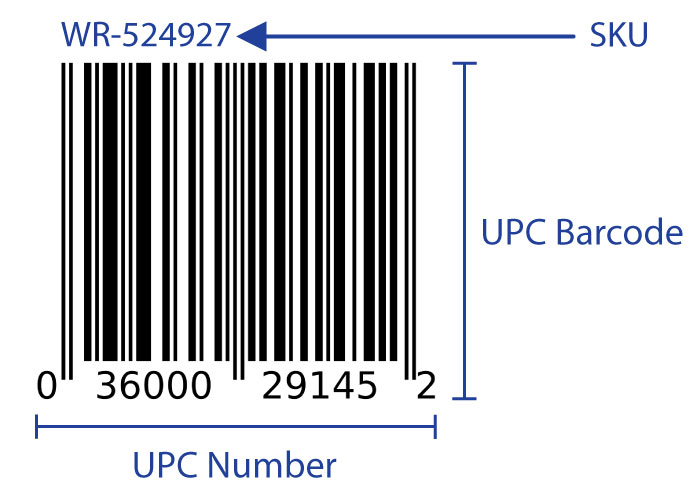
The stock keeping unit (or SKU in short) comprises a set of unique numbers that are helpful when trying to manage your inventory. This is particularly true when you are trying to move to a more automatic system. One thing to remember is that if you are a new e-commerce seller, SKU numbers are not essential. This is because there are alternatives that may be built into your platform.
However, it is also important to note that these alternatives work best when the number of different products you have is low. Once the business has started expanding, there will be complex inventory transactions that require a SKU. You must understand the trends within your sales and growth so that you can plan accordingly.
Through the strategic use of SKUs, you will be able to understand how your customers behave. Using this information, you can accurately predict future sales and stock accordingly. This guide provides you with key information that will be useful when implementing your SKU numbers.
What is a SKU?
The SKU is made up of a combination of letters and numbers which are unique so that you can easily identify a given product. The business can create its own SKU numbers depending on its product list. The end effect is developing a complex and yet effective classification of your product range.
When developing the SKU numbers, you will add vital identifying information that can help you make marketing decisions and respond to customer needs. Each SKU will have a combination of 8 to 12 characters. Stick to conventions so that it is easier for new staff members to understand how the SKU numbers operate.
Online retailers cannot do without SKU numbers for several reasons. First, they are oftentimes dealing with very large volumes of diverse products that can become confusing. Secondly, the online retailer has less control over the point-of-sale. This is very different from the traditional brick-and-mortar retailer that can easily check and replenish their stock by sight alone. The SKU numbers help the online retailer to track their stock using remote means.

Difference Between SKU and UPC
You might wonder as to how a SKU is any different from a traditional UPC. This is probably because you are used to seeing a universal product code (UPC) on most things you buy at the local supermarket. The role of the UPC is to use barcode technology to scan and identify products at checkout.
The major difference between UPC and SKU is that you can design your own SKU numbers whereas UPCs are readymade by a third party. The implication is that SKUs can be used by different retailers for entirely different products. In contrast, the UPC is what it is for specific products and the scan will yield the same information across retailers.
To be clear, no two different products can have the same UPC but they may have identical SKU numbers. The brand or manufacturer is responsible for developing the UPCs for you, but you are responsible for developing your own SKU numbers. Companies that manufacture their products can purchase UPCs from the US Barcode Authority which is Bar Code Graphics, Inc.
There are some factors that you might include in your SKU numbers that are not included in the UPCs. For example, you may specify the source and color for the same basic product. This will depend on the feedback you have received from your customers about their tastes and preferences.
How to Create a SKU System?
So how do you efficiently create your system of SKU numbers? The basic ingredients are a set of letters (always in CAPITAL) and numerals (0 to 9). Bear in mind that zeros (0) can visually be mistaken for the letter “O”. Hence you should minimize the use of zeros in your SKU numbers. Similarly, stay away from the letter “I” which can easily be mistaken for the number 1.
It is never advisable to use any special characters in your SKU numbers for purposes of simplicity and consistency. However, it is sometimes a good idea to use hyphens to separate pairs, triplets, etc. of numbers. Ensure that each of your products has a unique SKU within the management information system that you are using.
This is not just a case of coming up with random characters. Each of the characters in the SKU numbers should have a specific meaning for you and your staff. Prioritize the needs of the customers and the business when developing your SKU numbers. You can, for example, describe the product with initials, then use numbers to signify color, manufacturer, and size.
Given their basic functions, ensure that you always keep a list of SKU numbers in a spreadsheet or database format so any member of your staff can easily find them.
Who requires SKUs
Some platforms may have certain requirements involving SKU numbers. Here is a summary of two selected platforms:
- Shopify: You are given a choice of whether or not to use SKU numbers on Shopify. However, it is advisable to use them because they help you determine your optimum inventory levels so that you can order more product as necessary.
- Amazon: Here you need to have a European Article Number (EAN) or a UPC to utilize the Amazon marketplace. These can be purchased, if necessary. However, you do not need specific SKU numbers to operate on Amazon. Instead, Amazon creates an automatic ASIN which is an Amazon Standard Identification Number for items that are not books. For books, Amazon will use the ISBN as the ASIN. You can use ASINs in place of SKU numbers.
Benefits of SKUs
Using SKU numbers will help streamline your business (especially if you are in ecommerce). This holds even if you already have functional UPCs. Here are a few functions of SKU numbers:
Tracking sales
The use of SKU numbers will help you track which products are selling and which ones aren’t. This is a key aspect of inventory management. It is also important for forecasting and planning. This is particularly important when dealing with seasonality, a major headache for many online retailers.
Inventory management
Using SKU numbers will give you a boost when you are trying to automate your operations. This is a critical competency given the volume and speed of transactions that are taking place online. Using just a few characters, you can provide very detailed information about your products. You will have a very sophisticated ordering system that can go through categories and characteristics very easily.
The use of SKU numbers has proven to be very useful for reducing inventory errors. Even where products are very similar, you can easily distinguish them down to their last detail. This allows you to save valuable resources.
Handling returns
If you are using your SKU numbers effectively, you will better manage your returns so that you don’t irritate your customers or suffer unnecessary losses. Ecommerce businesses often have to deal with returns. Having a set of SKUs in place allows you to handle returns more efficiently. Not only will you pick and pack the right items; you will be able to return items to the right shelves.
Wrapping Up
As businesses are working to perfect their order fulfillment process, the use of SKU numbers has emerged as an important tool. This is a product identification tool that differs from UPCs. It is designed in-house and allows you to describe your products in detail using no more than a total of 8-12 letters and numbers. Using SKU numbers well will result in better management information and will help you better respond to the needs of your customers.


